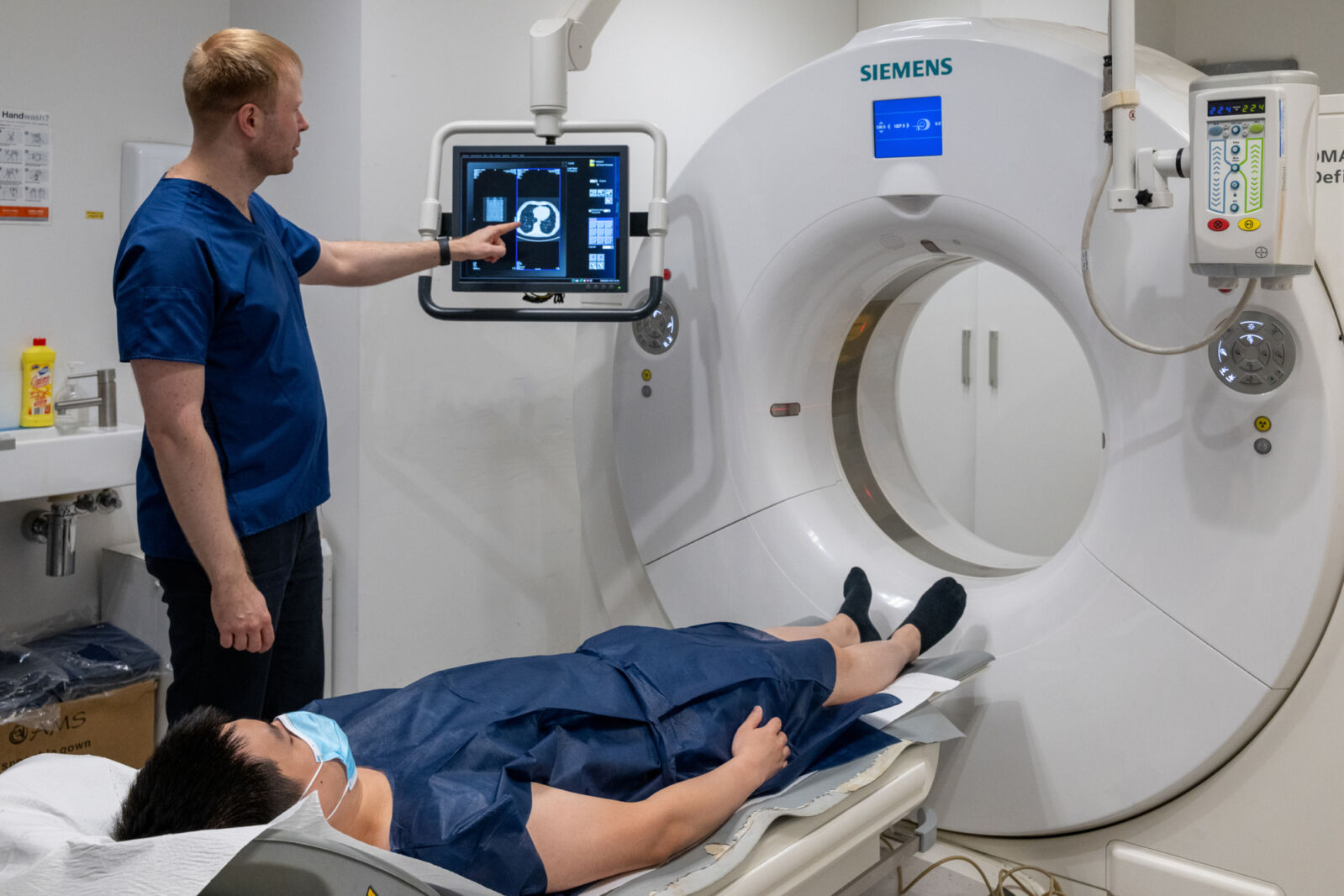
CT Coronary Angiogram (CTCA) Scans
A CT coronary angiogram (CTCA) is a non-invasive imaging technique used to visualize the coronary arteries (which are the blood vessels that supply the heart muscle with oxygen-rich blood). It involves using a computed tomography (CT) scanner to generate detailed images of the coronary arteries, similar to a traditional angiogram but without the need for invasive procedures.

Cardiac CT (Coronary Angiogram/CTCA)
High Resolution, Low Dosage
Cardiac CT also known as a Coronary Angiogram or shortened to CTCA, is a specialised scan of the heart. Usually referred by a Cardiologist, it is utilised to visualise the coronary arteries.
At Harbour Radiology we try to minimise the radiation exposure while maximising the quality of the scan. As part of this, for CTCA's we will give patients specific instructions prior to coming in, and we monitor the heart during your time on-site to reduce the need for any rescanning. As the heart is a moving organ, a low heart rate is required to give the machine time to scan in between heart beats. This is important to reduce "motion artefacts" which are akin to blurry or moving parts on a photo and can hide pathologies.

CTCA: Uses and Diagnostic Procedure
CTCA's are used for a wide variety of diagnostic purposes, such as congenital artery abnormalities, coronary diseases and pre-operative planning.
At Harbour Radiology we have specialist Radiologists who have undergone further training in CTCA reporting through the Conjoint Committee for the Recognition of Training in CT Coronary Angiography. They are known as a CTCA Specialists. This is unique sub-speciality within Radiology that requires regular recertification and intensive training.
Frequently Asked Questions
How to prepare for CTCA scan?
- Fast (avoid heavy meals) 4 hours prior to the exam, can keep taking your usual medication
- Arrive 1 hour prior to appointment.
- Notify our staff of any allergies (particularly previous contrast allergy)
- No caffeine (coffee) 24 hours prior to scan.
- No exercise on the day of the scan and no smoking 4 hours prior.
- Do not use medications which may increase your blood pressure or heartrate for 36 hours prior.
- Drink 3 - 4 glasses of water prior to the study.
- If you are a diabetic on any oral medication, or if you have kidney disease, bring a copy of recent kidney function test.
- If possible, have someone accompany you. You may feel dizzy or lightheaded after the scan and may not be able to drive for 1-3 hours
Why am I being referred for a CTCA?
Referring for CTCA, or computed tomography coronary angiography, is often done to further evaluate patients with suspected or known coronary artery disease (CAD). CTCA is a non-invasive imaging technique that uses computed tomography to visualize the coronary arteries. It provides detailed images of the coronary arteries and can detect blockages or narrowing of these vessels.
What happens during a CTCA?
- Upon check in, our staff will ask you to fill out a form. This is to gather your background medical history and to ensure you can safely undergo a CTCA.
- You will be taken into a room where one of our radiographers will check your heart rate using an ECG. This will then be reviewed by one of our Radiologist to ensure your heart rate is within desired parameters. If your heart rate is above 60 beats per minute, you may be given an oral beta-blocker medication to lower it. Our staff will monitor your heart rate until it has lowered to an adequate level.
- You will be taken to the CT room. Before commencement of your scan, nitroglycerine will be sprayed in your mouth to dilate your coronary arteries.
- You will be asked to lay down on the CT bed. A cannula will be inserted into a vein of your arm and used to inject some iodine contrast agent.
- The scan will then start. Multiple images of your coronary arteries will be taken, and you will be asked to hold your breath for 10-12 seconds each time a new image is recorded (as breathing might reduce image quality). You can expect this to last between 20-30 minutes.
How long does a CTCA take?
On average, you can expect to be with us for 1-2 hours when coming for a CTCA. This includes the necessary time to monitor your heart rate pre-CT, as well as scanning and post-CT monitoring. However, please note that in some cases you could be with us for a longer period, particularly if you needed to take medications to slow your heart rate.
What is the cost of a CTCA?
If you have been referred for a CTCA by a Specialist (i.e., cardiologist), this scan will be covered by Medicare. If you received your referral from a General Practitioner, there will be an out of pocket cost. Please enquire with our reception staff for an accurate quote.